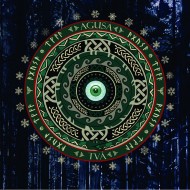 Agusa are a psychedelic progressive rock band from Sweden. Reading their story, they formed in 2013 as a kind of organic project where they sat in a forest, played 70s prog and took it from there. This two track album is the follow-up to their debut album “Högtid” (Feast).
Agusa are a psychedelic progressive rock band from Sweden. Reading their story, they formed in 2013 as a kind of organic project where they sat in a forest, played 70s prog and took it from there. This two track album is the follow-up to their debut album “Högtid” (Feast).
As I listened to “Två” (Two), I couldn’t help comparing it in my mind to “Tubular Bells”, not just for the reason they consist of two long tracks. “Två” goes through numerous transformations. I have to admit that I didn’t like it at first, especially “Gånglåt Från Vintergraten” (Marching Tune from the Milky Way). The title suggests it should be a hazy, cosmic dream but in fact it’s the 70s style organ which dominates and presents a fairly dreary tune to the accompaniment of a steady drum beat. There’s a faintly Celtic feel and the flute works through the uninspiring atmosphere. It’s kind of hippie but mostly hypnotic. The flute takes the scene up a level in a wistful and atmospheric way. I half expected panpipes but this is more folk music of the forest than the Andes. I liked the Celtic suggestiveness and it has purity but I could not describe it as exhilarating. Maybe I was the wrong frame of mind, because when I listened to it again, it hung together better and the organ sounded less like someone fulfilling an obligation in a club or pub on a Friday night. A funky guitar section livened it up but it took a long time coming. Again the first time I heard this, “Gånglåt Från Vintergraten” seemed to go on forever but on the second and subsequent occasions the seventeen minutes that it took to get the final phase seemed more like its actual duration of seventeen minutes. As the acoustic guitar played out a constant sound with clock-like regularity, a cosmic background created the floaty dreamworld that I had led myself to expect.
I warmed more quickly to “Kung Bores Dans”. Calm and peaceful, the air became filled with melancholic emotion. I felt a faint tinge of jazz, but the highlight was an overwhelming guitar passage. “Kung Bores Dans” is more upbeat and pleasant than “Gånglåt Från Vintergraten”. But then it stops in mid stream, and winds can be heard. I now felt as if I was amid nature in the woods. The flute is played to good effect. Normal service is resumed as the constancy of 70s style prog returns, but at least the wistful emotions evoked by the flute resurfaced before the end.
To derive full enjoyment from “Två”, it helps to like 70s prog and to be in the right mood when listening to it. After disliking it intensely to begin with, I got to appreciate its calmness but I still had no sense of being anywhere or in any cosmic state of other-worldliness where I could just absorb and enjoy the moment. In fact “Två” found for me the worst of both worlds where the constancy had little impact while the movements were unnatural and had no flow. “Två” was nice in parts but ultimately I found it was an underwhelming experience.
(5/10 Andrew Doherty)

Leave a Reply